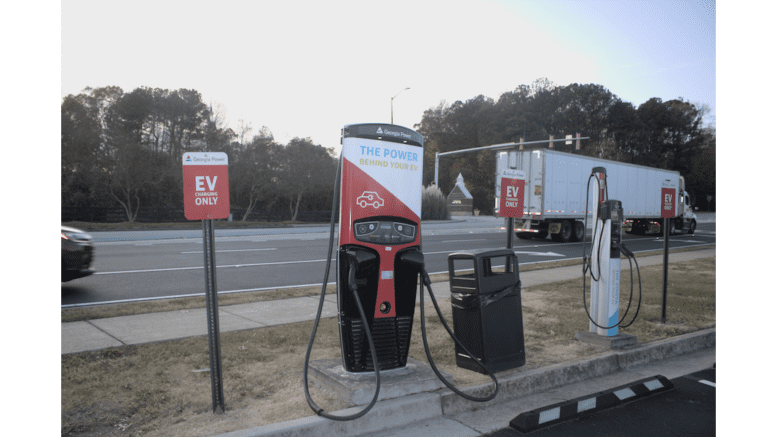by Stanley Dunlap, Georgia Recorder [This article first appeared in the Georgia Recorder, republished with permission]
February 22, 2023
A Georgia House committee unanimously passed a plan on Wednesday that would mark a major shift in the future of electric vehicles in the state by establishing new charging fees that are similar to the cost of refueling a car.
House Bill 406 will allow for the owners of convenience stores and other commercial sites where electric vehicle chargers are set up to sell electricity based on the kilowatt hour instead of the amount of time it takes to recharge. The change also sets guidelines for new taxes that are designed to recoup some of the lost fuel taxes that currently bring in $2 billion annually to build and repair roads and bridges in the state.
The bill’s sponsor Rep. Rick Jaspere said that the measure implements many of the recommendations made to a Joint Study Committee on Electrification of Transportation as it met for several months to figure out how to reach a strong consensus.
The bill received the support of the state’s convenience store association, Tesla, the largest provider of electric charging stations, as well as Georgia Power and Georgia EMCs.
“We had testimony on auto dealers, on storage of cars, direct sales, we chased every rabbit that there was in the world. And that I think people looked at us to make sure that we, as a group, made sure they were safe and are accurate in taxing because nobody wants to pay more than they use,” the Jasper Republican said at the Wednesday’s House Technology & Infrastructure Innovation Committee meeting.
The growth of electric vehicle and battery manufacturers in Georgia has prompted Gov. Brian Kemp to declare it his mission for the state to become the electric mobility capital of America.
As part of President Joe Biden’s Bipartisan Infrastructure Law passed last year, $135 million has been allocated to Georgia to help cover costs of installing new charging stations.
If the new legislation is approved, the Department of Agriculture would be in charge of inspecting charging stations for safety and to verify that electric vehicle owners are accurately being charged based on the amount of electricity it takes to recharge.
The bill has the backing of the state Department of Agriculture, which already handles the inspection of fuel pumps at gas stations. It could take several years as the emerging technology for the testing equipment is readily available and to allow time to hire enough inspectors to handle the growing electric vehicle market.
“Other states have moved forward, and then they’re having to kind of roll back a little bit so I would love for us to jump in and a handful years,” said Katherine Russell, director of policy for the agriculture department.”I think that it would be prudent that we really examine what that looks like by looking at other states experiences.”
During Wednesday’s committee hearing, one concern was whether electric vehicle owners will have to pay too many fees with excise and sales taxes to go along with an annual charge, making battery-powered vehicles less attractive to purchase.
The bill does not change the annual $211 fee paid by the owners of small battery-powered cars and $317 charged to owners of commercial electric vehicles. The fee is designed to cover the average amount in fuel taxes that a regular car owner would pay for wear and tear on state roads. The state charges about 30 cents per gallon in motor fuel taxes.
That fee, however, could go away in the coming years as the Georgia DOT will soon take part in a national pilot project that will allow drivers to track and pay based on how many miles they drive their electric car.
Many of Georgia’s convenience stores are in prime locations that can propel the state to become a national leader in electric vehicles, said Angela Holland, president of the Georgia Association of Convenience Stores.
However, there is concern that Georgia Power’s ability to recover the costs of its own charging stations will put the store owners at a competitive disadvantage, she said.
A three-year Georgia Power rate plan approved by state regulators earlier this year gives business owners first right of refusal if the utility company plans to install charging stations within a certain distance of the business.
The convenience store associations and other groups have recommended that regulated utility companies create a separate subsidiary that oversees electric charging stations.
“One of our fears is that utility companies provide a rate to private providers who will need to have some sort of markup on that to cover their costs,” Holland said. But if they deploy a charging station, what will they charge themselves the same rate, will it include demand charges? There’s nothing to require them to charge the same rate as a producer, distributor and now a retailer.”
Rep. Sam Park, a Lawrenceville Democrat, asked about the level of concern that the state could see a decline in revenue for roads and bridges as the electric vehicle market and other alternative fuel technologies become more efficient.
Jaspere said that’s an area where state leaders will continue monitoring to ensure there is enough funding. Georgia is one of the few states that’s ahead of the game figuring out this problem, he said.
“We are the leader,” he said. “We are absolutely on the cutting edge of this.”
Georgia Recorder is part of States Newsroom, a network of news bureaus supported by grants and a coalition of donors as a 501c(3) public charity. Georgia Recorder maintains editorial independence. Contact Editor John McCosh for questions: info@georgiarecorder.com. Follow Georgia Recorder on Facebook and Twitter.




